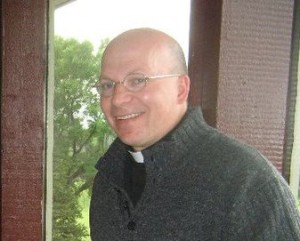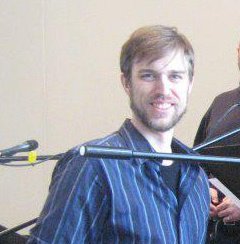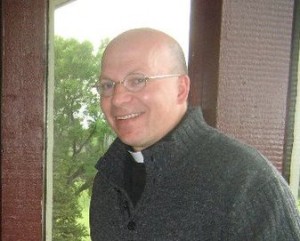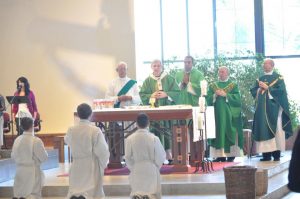Last week, Fr. Bob Weighner wrote about the third leg of the Catechism of the Catholic Church (CCC), “How We Live.” In this blog posting, Margie Mandli, parishioner of St. Anne and contributor to this series offers a perspective on “how to live” through the Cardinal Virtues, which are discussed in-depth in the CCC, section 1804. Margie, an independent marketing communications consultant, along with her husband, Mark and their three children, reside in Kenosha. You’re invited to attend the St. Anne Lenten Mission, “How to Live Your Faith in a Challenging World,” on the evenings of Wednesday, March 21 through Friday, March 23.

How am I going to live today? Do you ever wake up and ask yourself this question? Honestly, I can’t say that I do. For me, I go from task to task.
5:30 a.m. Get ready…say my morning prayers (often too quickly)
6:30 a.m. Pick out kids’ clothes (yes, I still take pride in doing this for my kiddos)
6:45 a.m. Make lunches for the family
7:10 a.m. Get on the road – the rush begins
8:00 a.m. Start my to-do list at work or home
Imagine if I started my day, and I asked God these questions:
- To whom do I need to be merciful?
- How can I be more patient?
- Whom do you want me to comfort?
- Who needs Your light today, and how can I help spread it?
Okay, I’ll try it. Maybe, I’ll let you know how it goes.
Meantime, in the last blog, Fr. Bob introduced the third leg in the Catechism of the Catholic Church (CCC), “How We Live.” This part of the CCC addresses how we live
our faith and discusses in depth everything from morality to vocations to a
closer look at the Beatitudes. Admittedly, I don’t often refer to this book…
in the middle of a disagreement with my child or with my husband or when making
an important life decision. Yet, how often are we faced with critical questions
or decisions in life?
- Is this a good movie for my kid?
- What should be the consequence for this action?
- Should we buy this new “toy” for our family?
- Is that appropriate attire for this occasion?
- For whom should I vote?
- Are we spending too much time [fill in the blank]?
- Is this the right job for me?
In fact, I believe all of these questions are about “how we live” our faith. I once thought –
perhaps in college – that I could separate my faith (Mass on Sundays) from my life (what I do on the weekends). The older I’ve become, I realize this notion is simply not possible. Society, in many ways, would like to separate religion from culture. We see it in the news, in movies and in our culture all the time. Nowadays, it seems that anything is permissible in the eyes of society.
When faced with questions like the ones above, Mark and I often feel inadequate to answer them. So, sometimes we turn to the Lord for guidance. According to the CCC,
“Catechesis has to reveal in all clarity the joy and the demands of the way of Christ…for the newness in life in him should be a catechesis of the Holy Spirit, the
interior Master of life according to Christ, a gentle guest and friend who inspires, guides, corrects and strengthens this life.”
Isn’t it true that life can be so demanding and joyful at the same time? Isn’t it true that often it feels as if we are carrying the weight of the world on our shoulders with
nowhere to turn?
Recently, I took note of section 1804 of CCC on Virtues. It stated, “Human
virtues are firm attitudes, stable dispositions, habitual perfections of intellect and will that govern our actions, order our passions, and guide our conduct according to reason and
faith. They make possible ease, self-mastery, and joy in leading a morally good life. The virtuous man is he who freely practices the good.”
Incidentally, there are four virtues that are deemed pivotal as a way of life, otherwise known as the four Cardinal Virtues:
- Prudence, that disposes practical reason to discern our true good in every circumstance and to choose the right means of achieving it
- Justice, moral virtue that consists in the constant and firm will to give their due to God and neighbor.
- Fortitude, the moral virtue that ensures firmness in difficulties and constancy in the pursuit of the good.
- Temperance, is the moral virtue that moderates the attraction of pleasures and provides balance in the use of created goods
How awesome is it that these virtues have been so well articulated? That they can be our moral compass in the multitude of decisions we are faced with each day?
Perhaps, I have just identified my new prayer: to ask God for an increase in these virtues.
Maybe then the weight of the world won’t seem so heavy.
 I remember once hearing the phrase ‘presence is truth’. I’m not sure who said it, or what the context was, but the words rang true. They express the simple fact that if I truly care about someone or something, then I will make the effort and take the trouble to be present when they need me. John Paul II was fond of saying that the modern world does not need more empty words. Talk is cheap. What the world truly needs is people who give authentic witness of their faith, people who really LIVE the faith, people who ‘put their money where their mouth is’.
I remember once hearing the phrase ‘presence is truth’. I’m not sure who said it, or what the context was, but the words rang true. They express the simple fact that if I truly care about someone or something, then I will make the effort and take the trouble to be present when they need me. John Paul II was fond of saying that the modern world does not need more empty words. Talk is cheap. What the world truly needs is people who give authentic witness of their faith, people who really LIVE the faith, people who ‘put their money where their mouth is’.
 A few weeks ago in a homily I used the image of a 4-legged table to describe a holistic approach to our Catholic faith. If you remove one leg from a table, you can make it work depending on where you place objects on the surface. If you break off a second leg, you don’t have a very useful table. You might get inventive and prop the table in a corner, and get by, but you’d have to admit the limitations of the situation. Our faith stands on four legs, or pillars. The Catechism of the Catholic Church is structured to reflect these four pillars, and gives us a quick way of checking on the health of our spiritual table, on how authentically we are living our Catholic faith.
A few weeks ago in a homily I used the image of a 4-legged table to describe a holistic approach to our Catholic faith. If you remove one leg from a table, you can make it work depending on where you place objects on the surface. If you break off a second leg, you don’t have a very useful table. You might get inventive and prop the table in a corner, and get by, but you’d have to admit the limitations of the situation. Our faith stands on four legs, or pillars. The Catechism of the Catholic Church is structured to reflect these four pillars, and gives us a quick way of checking on the health of our spiritual table, on how authentically we are living our Catholic faith. The ‘second leg’ is an answer to the question: How does God continue to effectively give us
The ‘second leg’ is an answer to the question: How does God continue to effectively give us It is clear, from these words of Jesus, that he intends to give himself to us sacramentally. This gift is not ‘just symbolic’, but is a true gift of God himself. The life contained in the sacraments is made effective through the saving sacrifice which Christ endured in his Passion. His life’s blood, poured out sacrificially on the cross, is the life of the Church. There is a wonderful depth, vividness and ‘down to earth’ quality to the sacramental and liturgical realties. For this reason Jesus clothed himself in our flesh, so that he could give himself to us through our senses, through our humanity. The liturgy celebrates this wonderful way of God’s relating to us, through which we are drawn into his life.
It is clear, from these words of Jesus, that he intends to give himself to us sacramentally. This gift is not ‘just symbolic’, but is a true gift of God himself. The life contained in the sacraments is made effective through the saving sacrifice which Christ endured in his Passion. His life’s blood, poured out sacrificially on the cross, is the life of the Church. There is a wonderful depth, vividness and ‘down to earth’ quality to the sacramental and liturgical realties. For this reason Jesus clothed himself in our flesh, so that he could give himself to us through our senses, through our humanity. The liturgy celebrates this wonderful way of God’s relating to us, through which we are drawn into his life.